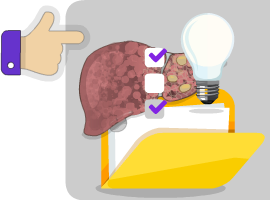Anyone with liver disease should NOT drink alcohol.
Alcohol affects everyone. When a person has a drink, the alcohol is absorbed through the wall of the stomach and intestine into the bloodstream, where it is sent throughout the body. Alcohol affects the brain, heart, muscles and other tissues of the body.
Age, gender, body weight, and genetic factors can all affect the way alcohol is processed by the body. For example, women absorb more alcohol from each drink than men do and tend to be more susceptible to alcohol-related liver damage.
The liver filters and processes everything a person ingests, including alcohol. If the liver is damaged, even small amounts of alcohol can make things worse.
Finding it hard to avoid alcohol?
Cutting down or stopping drinking may be difficult at times. Most people do not cut down or give it up all at once. Just like going on a diet, it is not easy. That’s OK. If you don’t reach your goal the first time, try again. Get support from people who care about you and want to help. Don’t give up!
Drinking Diary
To keep track of how much you drink, use a drinking diary. Record the number of drinks you have each day. At the end of the month, add up the number of drinks you had each week.
Change Plan
One way to make any kind of change in your behavior is to come up with a “change plan.” This exercise has you list the specific goals you would like to achieve, outline the steps and challenges you will meet in reaching those goals, and figure out ways to overcome those challenges.
Helpful Tips
- Keep no alcohol, or only a small amount at home.
- If you drink, sip your drink slowly. Take a break of 1 hour between drinks. Drink water or non-alcoholic drinks after a drink with alcohol. Do not drink on an empty stomach! Eat food when you are drinking.
- If you drink, pick a day or two each week when you will not drink at all. Then, try to stop drinking for 1 week. Think about how you feel physically and emotionally on these days. When you succeed and feel better, you may find it easier to cut down for good.
- You do not have to drink when other people drink. You do not have to take a drink that is given to you. Practice ways to say no politely. For example, you can tell people you feel better when you drink less. Stay away from people who give you a hard time about not drinking.
- Watch out for people, places, or times that make you want to drink, even if you do not want to.
- Stay away from people who drink a lot and avoid bars where you used to go.
- Plan ahead of time what you will do to avoid drinking when you are tempted.
- Don’t drink when you are angry or upset or have a bad day. These are habits you need to break if you want to drink less.
- What would you do instead of drinking? Use the time and money spent on drinking to do something fun with your family or friends. Go out to eat, see a movie, or go for a walk.
References:
The information on this page was adapted (with permission) from the references below, by the Cirrhosis Care Alberta project team (physicians, nurse practitioners, registered nurses, registered dietitians, physiotherapists, pharmacists, and patient advisors).
This information is not intended to replace advice from your healthcare team. They know your medical situation best. Always follow your healthcare team’s advice.
References:

